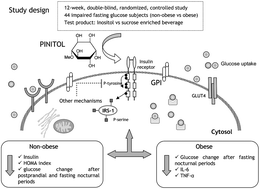Effect of consumption of a carob pod inositol-enriched beverage on insulin sensitivity and inflammation in middle-aged prediabetic subjects†
Abstract
This study assessed the effects of an inositol-enriched beverage (IEB) on blood glucose levels and inflammation status in subjects with an impaired fasting glucose (IFG) state according to body mass index (BMI). This was a 12 week, double-blind, randomized, controlled trial employing forty-four IFG subjects (fasting glucose levels 100–125 mg dl−1) that were divided into two intervention groups: one receiving a IEB (n = 24) containing mainly pinitol (2.0 g twice a day), and the other a sweetened beverage based on sucrose (SB; n = 20). Anthropometric and biochemical measurements, postprandial and fasting nocturnal glycaemia (continuous glucose monitoring system), and inflammatory parameters (IL-6 and TNF-α) were analyzed at baseline and after intervention according to BMI (non-obese: BMI < 30 kg m−2 or obese: BMI ≥ 30 kg m−2). Non-obese subjects who consumed IEB exhibited a significant decrease in insulin (−14.4%), HOMA-IR index (−15.1%) and percentage of glucose change after postprandial and fasting nocturnal periods (−10.0% and −10.3%, respectively) compared with the SB group (−2.35% and 10.2%, respectively) although they did not show any change in inflammatory cytokine levels. By contrast, obese subjects who consumed IEB showed a smaller variation in glucose levels after nocturnal fasting (−4.34%) and a marked decrease in IL-6 and TNF-α (p < 0.05). These findings support that consumption of IEB in prediabetic subjects produces a response that is dependent on BMI, with a clear improvement of insulin resistance and postprandial and nocturnal glycemia in non-obese subjects and a marked anti-inflammatory response in obese subjects.


 Please wait while we load your content...
Please wait while we load your content...